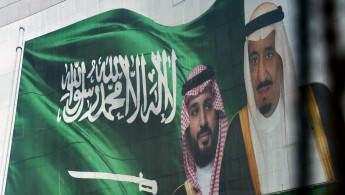Saudi Arabia using secret anti-terror courts to crush peaceful dissent, says Amnesty
The report published on Wednesday claims the kingdom's secretive Specialised Criminal Court (SCC) - originally set up for terrorism-related cases - is being used to crackdown on all forms of dissent with judges handing out "grossly unfair" sentences to silent critical voices.
The report accuses the court of exploiting vague anti-terror and cybercrime laws and extracting false confessions under torture to force confessions. Activists face harsh punishments, including the death penalty.
"The Saudi Arabian government exploits the SCC to create a false aura of legality around its abuse of the counter-terror law to silence its critics. Every stage of the SCC's judicial process is tainted with human rights abuses, from the denial of access to a lawyer, to incommunicado detention, to convictions based solely on so-called 'confessions' extracted through torture," said Heba Morayef, Amnesty International's Middle East and North Africa Regional Director, in a statement.
 |
Our research gives lie to the shiny new reformist image Saudi Arabia is trying to cultivate |  |
"Our research gives lie to the shiny new reformist image Saudi Arabia is trying to cultivate, exposing how the government uses a court like the SCC in the ruthless suppression of those who are courageous enough to voice opposition, defend human rights or call for meaningful reforms," she added.
Twitter Post
|
The findings of the 53-page document is based on the extensive examination of court documents, government statements and national legislation.
It is also the result of interviews with activists, lawyers and others linked to 95 SCC cases which are targeted primarily against human rights defenders, writers, economists, journalists, religious clerics, reformists and political activists, including those belonging to the country's persecuted Shia minority.
Amnesty also called for the immediate and unconditional release of all human rights defenders detained due to peaceful activism.
"If the king and crown prince want to show they are serious about reforms, they should as a first step immediately and unconditionally release all prisoners of conscience, ensure their convictions and sentences are quashed, and declare an official moratorium on all executions with a view to abolishing the death penalty," said Heba Morayef.
Saudi Arabia has launched a highly publicised campaign of social reforms in recent years, since the appointment of 34-year-old Mohammed bin Salman as crown prince and de-facto leader in 2017.
The young prince has cultivated an image as being a champion for women's rights in the kingdom, by granting women the right to drive and to travel without permission from male guardians.
The report took aim at these reforms as mere rhetoric, which "stands in stark contrast to the reality of the human rights situation in the country".
Several high-profile women's rights activists have been arrested since bin Salman's rise to power.
Loujain Al-Hathloul, a campaigner for women's right to drive, was arrested weeks before the ban on women driving was lifted.
Hathloul’s family have repeated claimed she has faced torture and sexual harassment, including threats of rape, while being interrogated.
In-depth: Lies, murder and deceit: the daily reality of Mohammed Bin Salman's war on dissent
Her brother has also said Loujain was offered release on condition that she give a video testimony denying that she had been tortured and sexually harassed in prison. She refused.
Saudi Shia men have also been disproportionately at the receiving end of the SCC's "grossly unfair" proceedings, according to the report. Many young Shia men have been tried for "crimes" they were accused of having committed when they were under the age of 18 and many now face the death penalty.
At least 28 Shia Muslims have been executed since 2016, many of whom were sentenced solely based on "confessions" extracted through torture.
The SCC was established in October 2008 to try individuals accused of terror-related crimes, notably those linked to Al-Qaeda.
Amnesty say that since 2011, it has been systematically used to prosecute individuals involved in peaceful activism on vague terrorism charges, as the country's counter-terror law contains a broad definition including peaceful expression of views.





 Follow the Middle East's top stories in English at The New Arab on Google News
Follow the Middle East's top stories in English at The New Arab on Google News
![Israeli forces ordered bombed Gaza's Jabalia, ordering residents to leave [Getty]](/sites/default/files/styles/image_330x185/public/2176418030.jpeg?h=a5f2f23a&itok=_YGZaP1z)

